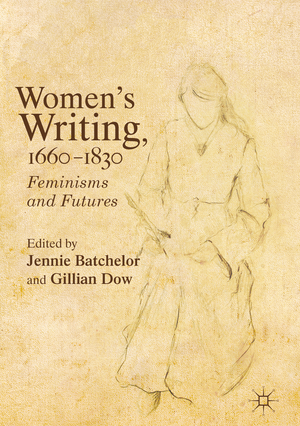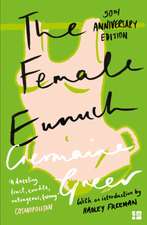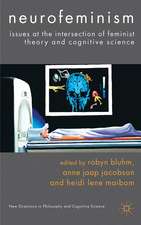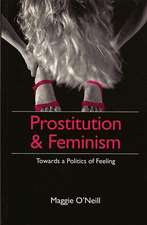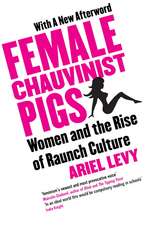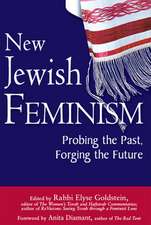Women's Writing, 1660-1830: Feminisms and Futures
Editat de Jennie Batchelor, Gillian Dowen Limba Engleză Hardback – 2 ian 2017
This book is about mapping the future of eighteenth-century women’s writing and feminist literary history, in an academic culture that is not shy of declaring their obsolescence. It asks: what can or should unite us as scholars devoted to the recovery and study of women’s literary history in an era of big data, on the one hand, and ever more narrowly defined specialization, on the other? Leading scholars from the UK and US answer this question in thought-provoking, cross-disciplinary and often polemical essays. Contributors attend to the achievements of eighteenth-century women writers and the scholars who have devoted their lives to them, and map new directions for the advancement of research in the area. They collectively argue that eighteenth-century women’s literary history has a future, and that feminism was, and always should be, at its heart.
Featuring a Preface by Isobel Grundy, and a Postscript by Cora Kaplan.
Preț: 728.74 lei
Preț vechi: 888.71 lei
-18% Nou
Puncte Express: 1093
Preț estimativ în valută:
139.45€ • 149.11$ • 116.27£
139.45€ • 149.11$ • 116.27£
Carte tipărită la comandă
Livrare economică 17 aprilie-01 mai
Preluare comenzi: 021 569.72.76
Specificații
ISBN-13: 9781137543813
ISBN-10: 1137543817
Pagini: 240
Ilustrații: XIII, 266 p. 4 illus.
Dimensiuni: 148 x 210 x 20 mm
Greutate: 0.48 kg
Ediția:1st ed. 2016
Editura: Palgrave Macmillan UK
Colecția Palgrave Macmillan
Locul publicării:London, United Kingdom
ISBN-10: 1137543817
Pagini: 240
Ilustrații: XIII, 266 p. 4 illus.
Dimensiuni: 148 x 210 x 20 mm
Greutate: 0.48 kg
Ediția:1st ed. 2016
Editura: Palgrave Macmillan UK
Colecția Palgrave Macmillan
Locul publicării:London, United Kingdom
Cuprins
Introduction: Feminisms, Fictions, Futures: Women’s Writing 1660–1830; Jennie Batchelor and Gillian Dow.- 1. Passing Judgement: The Place of the Aesthetic in Feminist Literary History; Ros Ballaster.- 2. Free Market Feminism? The Political Economy of Women’s Writing; E.J. Clery.- 3. Feminist Literary History: How Do We Know We’ve Won?; Katherine Binhammer.- 4. Anon, Pseud and ‘By a Lady’: The Spectre of Anonymity in Women’s Literary History; Jennie Batchelor.- 5. Authorial Performances: Actress, Author, Critic; Elaine McGirr.- 6. Pay, Professionalization and Probable Dominance? Women Writers and the Children’s Book Trade; M.O. Grenby.- 7. ‘There Are Numbers of Very Choice Books’: Book Ownership and the Circulation of Women’s Texts, 1680–98; Marie-Louise Coolahan and Mark Empey.- 8. Gender and the Material Turn; Chloe Wigston Smith.- 9. Archipelagic Literary History: Eighteenth-Century Poetryfrom Ireland, Scotland and Wales; Sarah Prescott.- 10. The ‘Biographical Impulse’ and Pan-European Women’s Writing; Gillian Dow.- Postscript; Cora Kaplan.- Notes.- Bibliography.- Index.-
Recenzii
“This is a brave and challenging Book. …we need to engage seriously with aesthetics and dare to make judgments, Most provocatively, she asks us to theorize and develop new methodologies appropriate to the very category of ‘woman writer.’” (Paula R. Backscheider, Early Modern Women Journal, Vol. 13 (2), 2019)
Notă biografică
Jennie Batchelor is Reader in Eighteenth-Century Studies at the University of Kent, UK. Her latest book, Women’s Work, was issued in paperback in 2014. With Cora Kaplan, she is Co-Series Editor of Palgrave’s History of British Women’s Writing (2010-). She is currently working on the first women’s magazines.
Gillian Dow is Associate Professor in English at the University of Southampton, UK, and Executive Director of Chawton House Library. She is the editor of several collections focusing on women writers, most recently, with Clare Hanson, Uses of Austen: Jane’s Afterlives (Palgrave, 2012). Her monograph in progress focuses on Romantic-Period translation and the novel.
Textul de pe ultima copertă
This book is about mapping the future of eighteenth-century women’s writing and feminist literary history, in an academic culture that is not shy of declaring their obsolescence. It asks: what can or should unite us as scholars devoted to the recovery and study of women’s literary history in an era of big data, on the one hand, and ever more narrowly defined specialization, on the other? Leading scholars from the UK and US answer this question in thought-provoking, cross-disciplinary and often polemical essays. Contributors attend to the achievements of eighteenth-century women writers and the scholars who have devoted their lives to them, and map new directions for the advancement of research in the area. They collectively argue that eighteenth-century women’s literary history has a future, and that feminism was, and always should be, at its heart.
Caracteristici
Features top scholars in the field of eighteenth-century women’s writing Takes stock of the field, and suggests future avenues of exploration Seeks to recover other lesser known women writers, as well as featuring essays on more established, canonical writers
